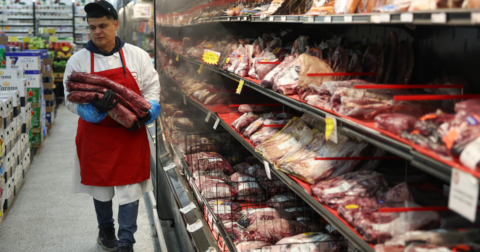Explainer
How To Explain Lab-Grown Meat Simply to People Who Aren’t Scientists
Food•10 min read
News
When a sweeping scientific study called for eating less meat, the meat industry launched a full-scale attack. And we could be in for a repeat.


Words by Seth Millstein
Several years ago, a high-profile study in a respected medical journal found that current meat consumption rates threaten planetary and personal health, and recommended that everybody eat less meat. Though peer-reviewed and scientifically sound, the report drew significant backlash — much of which was paid for by the meat industry.
In a few days, the study’s authors will release a major update. Will there be another wave of industry-funded criticism?
It’s not uncommon for businesses to oppose the spread of information that makes them look bad, regardless of whether or not it’s accurate. In some cases, they do this through strongly-worded public statements. In others, industries spread misinformation, launch covert public relation campaigns, and co-opt academic institutions in an attempt to protect their bottom lines.
That’s what happened after the 2019 study urging people to reduce their consumption of animal products in the name of personal and environmental health. The study didn’t call for worldwide veganism or government-mandated dietary change — but if you only read industry-funded criticisms of the report, you might have thought otherwise.
“Our analysis confirms that a digital countermovement managed to organise rapidly, essentially dominating online discussions about the EAT–Lancet report in intriguing and worrying ways,” a later analysis by Lancet concluded. And a similar effort may already be underway.
In 2019, the medical journal Lancet and the environmental nonprofit EAT collaborated to produce a sweeping meta-study on the connection between dietary trends, personal health and environmental wellbeing. A total of 37 researchers worked for over two years to answer the question: How can food producers feed the world’s growing population in a healthy manner without risking environmental collapse?
The report found that if current consumption habits continued unabated, greenhouse emissions would double by 2050. An increase in plant-based diets, meanwhile, could reduce emissions by up to 80 percent. The commission concluded that a global reduction in the consumption of sugar and animal products, along with a commensurate increase in consumption of plant-based proteins, will be necessary to feed the population by the year 2050 while avoiding environmental catastrophe.
“Global consumption of fruits, vegetables, nuts and legumes will have to double, and consumption of foods such as red meat and sugar will have to be reduced by more than 50%,” the EAT-Lancet Commission’s report read. “A diet rich in plant-based foods and with fewer animal source foods confers both improved health and environmental benefits.”
To anyone familiar with the environmental impacts of meat, dairy and egg production, the study’s findings weren’t a surprise. Livestock production is responsible for between 12 and 20 percent of all greenhouse gas emissions, and beef production in particular is the leading cause of deforestation.
The diet suggested by the report was by no means radical or even particularly new: In 1961, the average person ate 52 percent as much meat as they did in 2022, so a 50 percent reduction in meat consumption from 2022 rates is entirely feasible. Moreover, plant-based diets can be cheaper than carnivorous ones and just as healthy, and unlike some meats, plant proteins don’t lead to a higher risk of diabetes and cardiovascular disease.
The EAT-Lancet commission’s report encouraged people to adopt viable, healthy and affordable diets. But that’s not the picture critics painted.
Although the EAT-Lancet report was generally well-received, it drew significant backlash from certain writers and pro-meat social media influencers.
In a now-deleted article for the UK’s Spectator magazine, one writer claimed that the commission was attempting “to change your diet by force” (it wasn’t). A Psychology Today article accused the report’s conclusions of being “vague, inconsistent, unscientific, and downplay[ing] the serious risks to life and health posed by vegan diets.” This was an erroneous criticism, as the report didn’t encourage anybody to adopt a vegan diet, but that didn’t prevent other critics from alleging that it did.
Others attacked the report’s authors directly: The head of the Irish Cattle & Sheep Farmers’ Association argued that because Petter Stordalen, one of the EAT Foundation’s funders, is invested in an airline, the report’s conclusions regarding the environment couldn’t be trusted.
Meanwhile, on social media, popular pro-meat influencers used the hashtag #yes2meat to challenge the report’s recommendations and discourage a reduction in meat consumption.
After the report’s release, the Lancet conducted several analyses of the reactions and commentary that it inspired. The most common criticism was that it offered “inadequate consideration of the socioeconomic dimensions of global health and wellbeing.” Many critics said that the recommendations failed to appreciate “cultural values, consumer preferences and food dependencies” and that the prescribed dietary changes would be unaffordable for some.
Some critics also challenged the report’s conclusions regarding the environmental impacts of meat-based diets. However, the Lancet’s analysis found that these criticisms were “most often opinion-based rather than being supported by high-quality evidence.”
To be sure, some of the pushback against the commission’s report was organic. Meat is popular, and it’s no fun being told to cut back on a food that you enjoy. But since the report was released, information has surfaced suggesting that much of the opposition was the result of a coordinated campaign funded by meat industry interest groups.
In April 2025, reporting by the investigative news outlet DeSmog revealed that a public relations firm called Red Flag, which has worked with the meat industry in the past, had launched a coordinated smear campaign against the report and its authors as well in an attempt to discredit its findings. In an internal document, Red Flag boasted that its campaign was effective in ginning up opposition to the EAT-Lancet report.
“In the two weeks following publication of the EAT-Lancet report, this campaign’s messages have continued to demonstrate remarkable success,” Red Flag wrote in a post-hoc analysis of its campaign. “Key stories returned time and again in traditional and social media to reach major online influencers, particularly highlighting the radical nature of the EAT-Lancet diet and hypocrisy criticisms levelled at the EAT founders.”
Red Flag boasted that nearly half of the 1,315 critiques it analyzed had used the firm’s own “campaign messages and quotes” and that over 100 articles critiquing the report had accused Stordalen of being a hypocrite.
Red Flag wasn’t the only one to launch a coordinated effort to discredit the EAT-Lancet report. So did the CLEAR Center at UC Davis, an organization dedicated to “help[ing] the animal agriculture sector operate more efficiently.”
In 2022, Greenpeace obtained internal documents from the CLEAR Center showing that the center’s director, Frank Mitloehner, had launched “an academic opposition” of 40 scientists to dispute the findings of the EAT-Lancet report, and had successfully “mobilized a massive campaign” against it.
Meanwhile, an analysis of social media activity by the Changing Markets Foundation found that several influencers with significant followings began using the #yes2meat hashtag to criticize the commission’s findings before the report was even released. Such influencers included author and physician Ken Berry, and food scientist Frederic Leroy, who authored an article criticizing the report a week before its publication.
(Later in the year, Berry tweeted a falsified photograph of climate activist Greta Thunberg, in which she appeared to promote a carnivore diet, along with a plea to his followers to “help our planet by eating your meat!!!” Thunberg is a vegan.)
“It is evident that a counter-movement targeting the EAT–Lancet report began to organise around 1 week before its official launch date on Jan 17, 2019,” one of the Lancet’s post-hoc analyses concluded.
This opposition campaign was funded and organized by the very people who stood to lose the most from the EAT-Lancet commission’s report.
The CLEAR Center’s website acknowledges that it’s funded in part by the National Pork Board and the American Feed Industry Association (AFIA), a trade association for livestock feed companies. But this may be understating its ties to the livestock industry. In 2022, documents reviewed by the New York Times revealed that the center receives “almost all its funding from industry donations and coordinates with a major livestock lobby group on messaging campaigns.”
A confidential memo, also obtained by Greenpeace, found that the initial idea for the CLEAR Center came from the executive director of the AFIA, who wrote for the need to provide “impactful messaging to address the significant misinformation regarding the environmental impact of poultry and livestock production.” That same document also stated that AFIA had been “working with Dr Mitloehner on outreach to the dietician community” in an attempt to spread its message.
Meanwhile, DeSmog’s reporting suggested, but could not confirm, that the Red Flag campaign was conducted at the behest of the Animal Agriculture Alliance, a nonprofit established in 1987 to “safeguard the future of animal agriculture.” Sentient has reached out to the Animal Agriculture Alliance for comment.
By attacking scientific studies that paint its product in an unflattering light through a covert public relations campaign, the livestock industry is following in the steps of Big Tobacco, which took a similar approach to research showing that smoking is unhealthy. The tobacco industry’s campaign eventually faltered, and it’s now widely understood that tobacco is harmful on a massive scale. The World Health Organization calls it “one of the biggest public health threats the world has ever faced.”
Will the meat industry’s public relations blitz eventually suffer the same fate? It’s too soon to say, but a big test will come on Friday, when the EAT-Lancet commission releases the 2.0 version of its report. In recent months, Changing Markets’ analysis has found significant use of the #yes2meat hashtag leading up to the new report’s release, as well as a number of preemptive attacks on the document’s not-yet-released suggestions.
Bringing about dietary change is a difficult task even in the best of circumstances, and it’s even harder when a trillion-dollar industry is pulling out all of the stops to prevent such change.
But despite the best efforts of the livestock industry, consumers in Germany and the United Kingdom are eating less meat than they used to, at least according to some research. The trend may be a modest one, but if it continues, it shows that the industry’s influence, while formidable, is far from insurmountable.